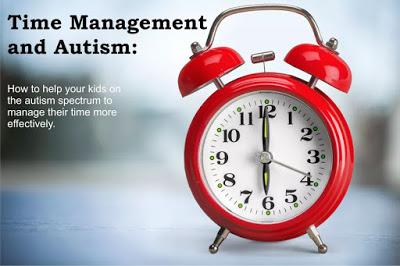
One of the things that people on the spectrum do really poorly is manage their own time. This is because people with autism often suffer from poor executive functioning. They have difficulty planning out their day or estimating how long a task will take. They're also very easily distracted.
Time management is a critical skill, particularly after your child had left school and is expected to take charge of their own day.
In this post, I want to look at some of the reasons why time management fails and some of the changes we can make to train ourselves to be better at it.
Who Manages Your Time?
In your formative years, you do very little time management and it's usually your parents who set alarms and cajole you out of bed, harass you into getting dressed, slog through the breakfast routine, push you into the car and drop you off at school.Once at school, you're at the mercy of the timetable but apart from getting the right books to the right classes on time, there's very little planning required.
Kids with special needs are often given longer to get from one class to another. Their books may be kept in lockers at the special needs unit and they often don't have to switch so significantly from one class to another. In short, many of their time management tasks are performed by the special needs unit, rather than the students themselves.
Ideally time management in the school years should start out being wholly the responsibility of parents and teachers but should gradually transition to the student as the years go by. This often doesn't happen for kids on the spectrum and as a result, many of them don't develop the skills they need.
Barriers to Good Time Management
There are lots of barriers to good time management which apply to everyone, particularly teenagers. These include a desire to sleep in, an undeveloped sense of how long things take and general laziness when it comes to work. Everyone has the common barriers but other barriers apply particularly to people on the autism spectrum.
Special Interests and Distractions
People on the spectrum are far more inclined to become distracted by things, particularly special interests and lose all sense of time. This isn't something that you grow out of; it's something that people on the spectrum need to continually fight throughout their lives.One morning, many years ago, when I was a teen, my father decided to melt some oil in the kitchen. It was something that people did back in the day. He realised that he needed a funnel and went down to his garage to get one. While he was down there, he noticed an imperfection in one of his models and decided to do some work on it. When I woke up, our kitchen was on fire.
My father had pretty good time management skills but he always struggled when a special interest distracted him from the task at hand.
Assuming Conditions will be Perfect
This is the bane of my life. You know how long it takes to get to work. You go there every day. It's 45 minutes. Today you have an important meeting, so you make sure that you're ready to go 45 minutes prior to the deadline.Unfortunately, you forgot to factor in change. For example, the idea that traffic is different at different times of the day, or that today there's a bus strike. Perhaps you didn't factor in having to fill the car up before you go or an extra change of clothes because you spilled some coffee on your shirt.
I still do have problems in this area and small changes like the difference between leaving the house before my wife wakes up and having to kiss her goodbye are enough to make me miss my bus.
These days I have a solution of sorts (getting to places extra-early) but no day is perfect and if you measure your time in minutes or seconds, you're bound to come unstuck sometimes.

Trying to Achieve Perfection
Striving for perfection sadly doesn't mean that your teen will have a perfectly tidy room or that their writing will be neat and tidy. There seems to be a set of arbitrary rules which govern the idea of perfection and what is and isn't included.As a child, when tidying my room, I'd always start with my bookcase (even though that was usually in pretty good shape). I'd sort the books into a specific order, alphabetical, series, genre or size before moving onto the rest of the room. This used to drive my mother crazy especially if we had to do a "quick tidy up" because someone was coming over.
Similarly, while my writing was neat, I'd go through phases of using a different font (handwriting, not computing) and a single failed character could sometimes make me want to rewrite the page ... even under exam conditions. ... and of course, then I'd run out of time.
It's sometimes quite difficult to know when to stop and accept what you've done as "the best you can do in the time you have" but it's a skill that needs to be learnt.
Improving on Time Management
Time management is an area where it's easy to judge whether or not you're improving. If you go from being always late to sometimes late, it's an improvement. It's simple to measure and believe it or not, it's not too hard to improve.Lists, Lists and More Lists
Many people on the autism spectrum do particularly well with lists. A list gives you a handle on what needs to be done and sometimes the order in which it needs to be done. You can also put times on the list or have separate sections for morning, evening and night.Lists can be on paper or electronic and there's a lot of satisfaction to be had when ticking things off a list as "done". For kids, lists can also be linked to rewards.

Have an Agenda
I didn't learn about agendas until I was finished school and into my working life. It's a shame because it would have made a huge difference.Change is particularly difficult for people on the autism spectrum and one of the best ways to mitigate the shock of change is to have advanced warning that it is coming. Having an agenda is the best way to do this.
The aim of an agenda is to itemise the main points of your day, including when things are expected to happen and what is needed at that particular time.
A typical agenda for a child might be one where you list breakfast, travel to school, the morning lessons, recess, late morning lessons, lunch and afternoon lessons. Then you list any after school activities, changes of clothes and travel. Mention dinner, TV or computer time and bed.
Ideally the agenda should be prepared a day earlier and you should walk through each of the items with your child determining what they need; for example, have you packed your lunch.
One of the many great ways in which my personal agendas work for me is that I always know what I'll be doing at the gym on the following morning, so my bag is always packed and ready to go, the night before.

Be Early. Be very very early.
As a teen, I liked to sleep in. I think it's a "growing thing", that the body is so tired with all the growing that teens do, that they need a lot of sleep. Once they're an adult though, there's a tendency to become a "night owl", to stay up really late and rise really late.Being late is a bad habit to get into. It causes you to add stress to your life when none is needed and it dramatically increases your risk, especially if you're driving.
These days, I'm always early. I try to allow myself to be where I have to be 30 minutes to an hour early. This means that I can drive slowly and accept poor drivers and transport snares around me with generally good grace. It means that when I'm looking for a car spot, I can take my time and that I can choose spots which are better placed even if they're further to walk.
If you take this to the extreme, you'll find that being an early riser has incredible benefits. These days I get up at 4.30am and it's amazing how much I can accomplish in those early hours. I'm not suggesting that those hours are for everyone but if you give yourself an extra hour in the morning, you'll find that you start your day in a much calmer and more satisfied manner.
Don't get distracted - set deadline times
Special interests are the worst distractions for people with autism. If I see an article about Doctor Who, time literally stops for me until I've read it.I've missed deadlines because although I've woken up well and truly early enough, I've looked at Facebook before getting changed and found an article that I want to read and respond to.
The same occurs when I'm writing and sometimes I simply can't write on the computer because there are so many potential distractions waiting for me. When that happens, I use my phone which can offer a simpler, cleaner and less distracting writing experience.
As a person on the spectrum, you need to be very aware of what things take your focus away and you need to take steps to avoid them at times when your schedule is tight.

One of the best ways to minimise distraction is to set a deadline time. For example, if I decide to switch over and look at YouTube, I'll look at the computer clock first and decide when I have to close YouTube -- It's not easy and sometimes I completely forget to look at the clock but I'm getting better at it.
Time management is a problem for everyone but with special interests, problems with change and issues of perfection, it can be a particular problem for people on the spectrum. It can be tamed though, with lots of practice, lots of preparation and a careful avoidance of distractions.

